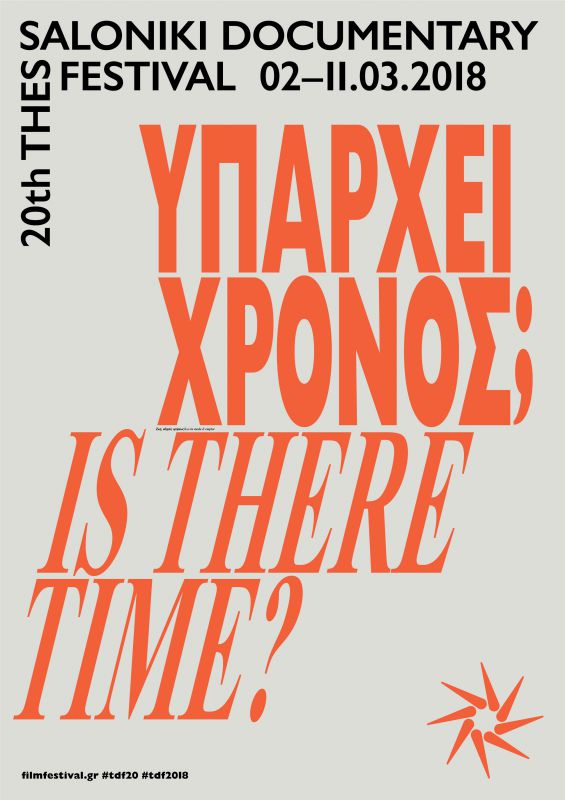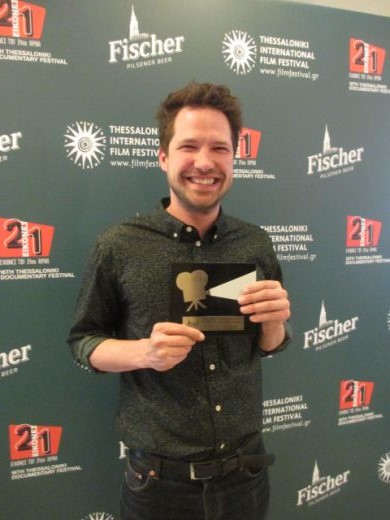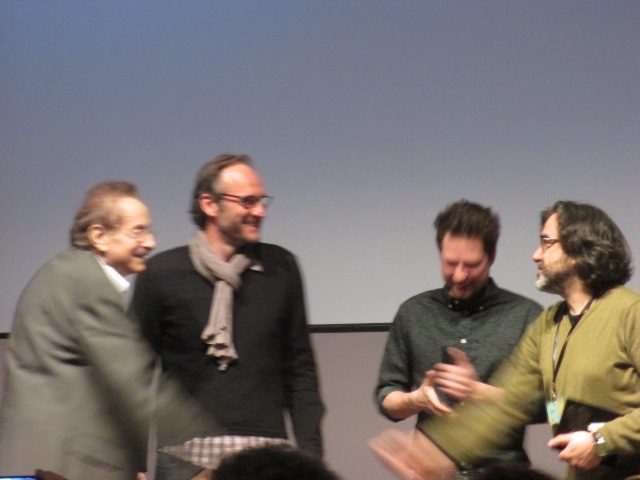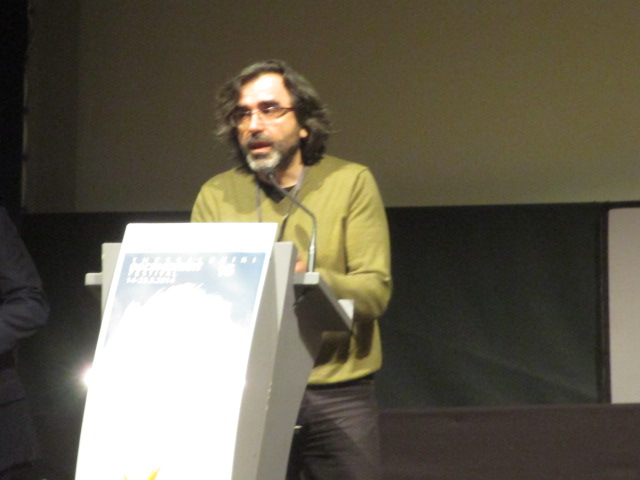|
|
||
|
Pro Tools
FILMFESTIVALS | 24/7 world wide coverageWelcome ! Enjoy the best of both worlds: Film & Festival News, exploring the best of the film festivals community. Launched in 1995, relentlessly connecting films to festivals, documenting and promoting festivals worldwide. Working on an upgrade soon. For collaboration, editorial contributions, or publicity, please send us an email here. User login |
DESERT RIDERS (2011) at 14th Thessaloniki Doc FestivalThe film DESERT RIDERS (2011) screened at the 14th Thessaloniki Documentary Film Festival. Writer/Producer Noemi Weis attended the festival in support of the film.
DESERT RIDERS is about the trafficking of poor children to Middle Eastern countries who are forced into slavery as camel jockeys for the extremely lucrative business of camel racing. Many of the children have died during the races or suffered from malnutrition and are scarred for life. Due to pressure from media in protesting nations the UAE banned the trafficking of children, but the sport continues in many countries, ruining the lives of many innocent poor children. In this documentary, surviving children and some of the traffickers themselves speak their voice about this crime against humanity. Writer/Producer Noemi Weis spoke at TDF about the film:
NOEMI: "We can blame it on the country or we can blame all the organizations in the world including the human rights organizations who never caught this and never asked ‘What’s going on with these children?' It's very hard. In the film we try to be as open as possible to give everybody a voice, including the countries where this is taking place. At the end it’s very difficult to say who is to blame... "3000 kids were brought back to their country when they lifted the ban in the UAE but they are scarred forever. The reality is that there are thousands of kids that never came back. There are organizations that are still looking for those children who disappeared and some kids that might still be working and we haven’t been able to recognize. The positive thing about this is that the ban was put into place because of media alert so it shows here, especially here at the press conference, that media can make a difference and we can make a difference with our work. So, there is a positive part about making this film. It’s also to show the fact that if we put our heads together we can put our efforts together to bring it to the forefront. "Now Arab countries claimed that they didn’t know but how could they not know when it was taking place right in front of them? But they say they didn’t know so we have to believe them. The film gives a broad possibility of opinions and the audience can make the decision. The ban was in place was because the USA put a lot of pressure into the Arab countries because they were allies on the war on terror and a partner that is involved in trafficking children is not a good partner to have so when the USA learned about it they said they had to stop, and they stopped it. "But the only country that has really done something was the UAE. The rest have not done anything. The UAE gave a little bit of money in comparison to the money they maybe should have got, but still there is an action and there is a problem and they recognize this so there’s room for apology. But the sad part is that these kids will never be the same. So we have to bring awareness and that’s why we do what we do."
Q: How difficult was it to research this film? And to get the people to get open to you and how hard was it to make this film?
NOEMI: "It was extremely hard. It was the most difficult film I have done so far. It took me a good year and half to get access to places. For me, being a woman from the West, coming into the countries was extremely hard. The most difficult part of the production was getting there and getting access but once we got into the different countries it was getting trust from people who would open up. The kids and the parents opened up but with the traffickers were a little harder. We got them but in the Arab countries it took me four months to get the interview. "We went to Mauritania and we were pretty much house arrested, despite having been told by Unicef that we were able to shoot. It was a very difficult country to be in. I was the only woman all the time and I stood out like a lantern. When we arrived the bureaucracy started and they would not let us shoot. They wouldn’t let me move by myself, even to go across the street from the hotel to buy water I had to go with an escort who would take me. It was pretty dangerous spending two weeks where every day was another exam with another group of men that would interrogate me and find out who I was, what I was doing, why I was there. "When I think about it, it was pretty courageous. In that moment, there’s a moment of blindness when you are passionate about the story you want to tell and you know that you’re doing it with all the good intentions but you don’t think about the danger. You’re just thinking that you have to get it done and people will understand that you’re there for the good cause. So, we could not shoot in Mauritania. We wanted to go to Saudi Arabia but it was impossible for me to go there so it was denied. We were going to go to the Sudan but the civil war started there so they wouldn’t allow me. So to get to some of the people we got, it was a very difficult journey."
Q: But it was worth it?
NOEMI: "I think so."
Q: How attached did you get to the people you interviewed, despite having to stay objective while making the film?
NOEMI: "For me personally I get attached to subjects so I suffer with them and you don't realize how hard the stories are. I didn't sleep at night sometimes. The worst story for me was the General in UAE. His affected me the most, the way the interview was held. I was the only woman. I was put into a corner and interviewed while I was there. I pretended nothing was going on but I was tense. The interview was very political and it brought up a lot of emotions for me, especially dealing with the children. I had times I couldn't sleep after interviewing kids who had been injected as children to not grow up. "Doing these kinds of films I learned to be very objective. You have to be objective or else you can't do the work you have to do. But you get close to these people and you can't let yourself be affected. There is a cathartic healing process that goes with it by talking about it and by making these films we feel like we are making a difference."
-transcribed by Vanessa McMahon
Writer/Producer Noemi Weis
DESERT RIDERS was directed by Vic Sarin (below)
17.03.2012 | Thessaloniki's blog Cat. : Album Albums recorded at Electric Lady Studios Business Business DESERT RIDERS (2011) at 14th Thessaloniki Doc Festival General Mauritania Noemi Weis Person Career Saudi Arabia Social Issues Social Issues Sudan the 14th Thessaloniki Documentary Film Festival United Nations International Children's Emergency Fund Vanessa McMahon Vic Sarin War War writer /producer FESTIVALS
|
LinksThe Bulletin Board > The Bulletin Board Blog Following News Interview with IFTA Chairman (AFM)
Interview with Cannes Marche du Film Director
Filmfestivals.com dailies live coverage from > Live from India
Useful links for the indies: > Big files transfer
+ SUBSCRIBE to the weekly Newsletter Deals+ Special offers and discounts from filmfestivals.com Selected fun offers
> Bonus Casino
User imagesAbout Thessaloniki Mcmahon Vanessa Mcmahon Vanessa Vanessa McMahon Covered the 13th and 14th, and 16th edition. Through its tributes, it focuses both on discovering filmmakers with a unique cinematic point of view, and on the internationally recognized for their contribution to documentary. Contributions from Buno Chatelin http://tdf.filmfestival.gr/default.aspx?lang=en-US&loc=6&page=760 View my profile Send me a message My festivalThe EditorUser contributions |




























